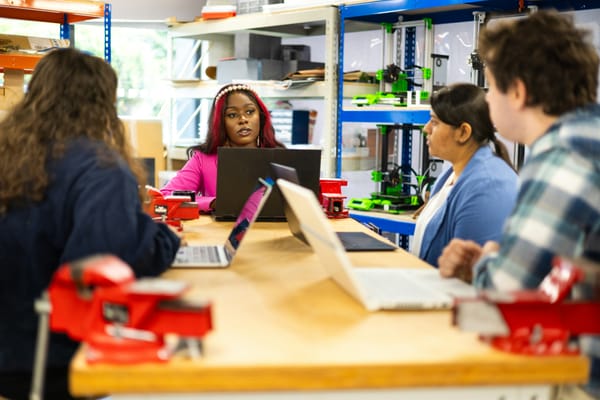5 Universities Championing Global Knowledge Exchange
Here are some great examples of UK universities carrying out collaboration projects across the globe.

As global challenges become increasingly complex, universities play a crucial role in fostering knowledge exchange and collaboration across borders.
Through international partnerships, university staff, students and researchers can share knowledge, lend resources, and develop innovative solutions to such challenges.
Read on to discover how these 5 UK universities are doing that globally...
Breaking Barriers: The University of Leeds Knowledge Equity Network Promotes Global Collaboration for Knowledge Exchange
Last year, the University of Leeds launched a global Knowledge Exchange initiative named the Knowledge Equity Network.
The project aims to address global knowledge inequalities by connecting researchers and practitioners from around the world and promoting the sharing of knowledge and resources.
The network includes representatives from a wide range of disciplines, including social sciences, humanities, and natural sciences, and focuses on topics such as climate change, social justice, and sustainable development.
Through its collaborative approach, the network seeks to promote more inclusive and equitable knowledge production and collaboration - one that is unhindered by barriers of cost, time or national borders.
As University of Leeds Vice-Chancellor Simone Buitendijk mentions in the feature video below:
''Universities are superbly placed to help solve the global challenges but they need to work together, no single university can do this by themselves.''
University of Leeds Deputy Vice-Chancellor of Research and Innovation Professor Nick Plant adds:
“Problems such as health inequalities, the climate crisis, societal movement, and the refugee crisis. These are problems of the world today. We cannot wait. We firmly believe that open and equitable access to knowledge is fundamental to solving these problems.”
Collaborating for a Greener Future: The University of Nottingham’s Sustainable Agriculture Research
The University of Nottingham has a strong reputation for international collaboration and has a wide range of research partnerships with universities around the world. This includes working with its first overseas campus, the University of Nottingham Malaysia (UNM).
The two campuses work together on research projects in fields such as healthcare, biotechnology, and sustainability.
One of the research projects that UNM and the main campus in the UK have worked on is sustainable agriculture. Researchers from both campuses are working to develop sustainable farming practices that can improve crop yields and reduce environmental impact.
According to this Research Impact Story by Professor Festo Massawe and Dr Ajit Singh:
''University of Nottingham researchers across our three campuses in Malaysia, UK and China are committed to reimagine ways to deliver sustainable food sources and nutritional security in a rapidly changing world.''
Through the Future Food open research platform, inter-disciplinary collaborations are bringing together the power of genome-enabled plant and animal sciences with cutting-edge nutrition science, food processing, manufacturing and digital technologies.
Find out more about Future Food here.
The University of Oxford: Developing Innovative Solutions to Sustainable Development Challenges in India
Oxford has a long history of promoting global knowledge exchange, with partnerships and collaborations with universities around the world. One of which is the Oxford-India Centre for Sustainable Development, a collaboration between The University of Oxford and a consortium of Indian Universities.
The Centre focuses on sustainable development in India through research and education and aims to address some of the country's most pressing environmental and social challenges.
The Centre's research themes include climate change, energy, water resources, and sustainable agriculture.
We had the pleasure of hosting @HCI_London @VDoraiswami’s visit to @UniofOxford. Our roundtable at the @OxIndiaCentre @SomervilleOx involved talented Indians researching women’s health, justice, sustainability, and more. Thank you to @PrincipalSomOx for hosting! 1/n pic.twitter.com/DTv7VuQ3JP
— The 1928 Institute (@1928institute) March 9, 2023
This collaboration allows for the sharing of knowledge and expertise and provides a platform for joint research projects.
The Centre has several ongoing research projects, such as studying the impacts of climate change on Indian agriculture and assessing the potential for renewable energy sources in the country.
By working together, researchers from both institutions can develop innovative solutions to sustainable development challenges in India, which can then be applied to other countries facing similar challenges.
The University of Cambridge: On-the-spot HIV testing to millions living with HIV in Africa
The University of Cambridge is another institution well known for its international partnerships and collaborations, including its membership in the League of European Research Universities (LERU) and the Cambridge-Africa Programme.
An example of a highly impactful KE project comes from Diagnostics for the Real World, a spin-out company from the University of Cambridge. The team developed a transformative point-of-care diagnostic tool which gives instant results for the detection of genetic material from the HIV virus.
The small, highly portable machine (known as SAMBA II) was a decade in the making and is helping to transform the lives of millions. The tool has been particularly transformative in the care of HIV-exposed infants who have just a one-in-two chance of early death if HIV infection is not diagnosed within the first six weeks of life.

Powering Medical Breakthroughs: The University of Manchester and Peking University Collaborate for Genomic Medicine Research
The University of Manchester is a leading institution in the UK with a strong track record of research excellence and global partnerships. It is one of the largest universities in the country and has a reputation for pioneering research across a wide range of disciplines, including science, engineering, social sciences, and humanities.
An example of one of its most impactful global collaborative partnerships is that with Peking University Health Science Centre (PUHSC).
The two parties established a partnership in 2013, joining forces to advance research into genomic medicine - a crucial area of health research.
Since the signing of the agreement, the two have collaborated on large-scale studies and research in genomic medicine, looking at conditions such as cancer, blindness, inherited heart disorders and more with the aim of developing new treatments and therapies.





